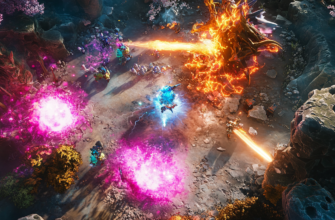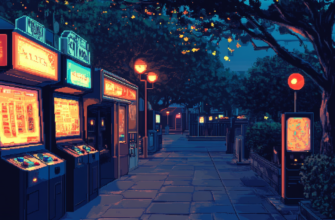- Why are games becoming more challenging: an inside look at developers’ motives
- What makes a game “challenging”? Key terms explained
- Step-by-step: why developers make games more challenging
- Step 1: Developers want gamers to feel a sense of accomplishment
- Step 2: Challenging games create a stronger, more engaged community
- Step 3: Difficulty adds replay value
- Step 4: Players are demanding more challenging games
- Step 5: Developers aim to create unique gaming identities
- Practical tips to master challenging games
- Tip 1: Patience is key
- Tip 2: Learn from every death or mistake
- Tip 3: Join the community
- Tip 4: Set mini-goals
- Tip 5: Optimize your gear and controls
- Conclusion: embrace the challenge
Why are games becoming more challenging: an inside look at developers’ motives
Hey there, fellow gamers! You ever sat down with a shiny new game, super excited to test it out, only to find it absolutely *brutal* from the get-go? Yeah, I’ve been there too. From pixel-perfect platformers to unforgiving shooters, it feels like gaming is giving our reflexes and patience a real beatdown these days. But why?
Why are developers making games almost *frustratingly* difficult? Is it just to see us suffer, or is there some deeper reasoning? Join me while we explore the motives behind tougher gaming experiences. Buckle up, because this dive into the world of challenging games could give you a perspective shift!
What makes a game “challenging”? Key terms explained
Before diving into the reasons behind difficult games, let’s take a quick look at what exactly defines a challenging game. There’s a spectrum at play here:
- Difficulty spikes: This refers to moments in games where the challenge suddenly ramps up, usually to test your skills. Think of that crazy boss fight after a relatively easy level.
- Permadeath: A feature sometimes found in hardcore games where when your character dies, they stay dead for good, forcing you to restart from scratch or reload a checkpoint with severe consequences.
- High skill ceiling: When mastering a game takes not just time but strategic knowledge, precision, and the development of muscle memory. Games like “Dark Souls” or competitive MOBA titles typically fall under this category.
- Punishing mechanics: Features designed to make small mistakes feel big. Missed a jump by an inch? Sorry, back to the start of the level for you, buddy!
A difficult game combines any of these aspects to challenge not just your reactions, but your mental and emotional resilience too. Now that we know what makes a challenging game, let’s uncover why developers are making it *the norm*.
Step-by-step: why developers make games more challenging
It may seem like developers just sit behind their PC screens, twiddling their thumbs and laughing at our frustrations. But, in reality, there are legitimate reasons for raising the difficulty of many modern games. Let’s break it down:
Step 1: Developers want gamers to feel a sense of accomplishment
Ever finished a game that was way too easy, and then immediately forgot about it? Part of what makes gaming so awesome is the sense of accomplishment we feel when we finally achieve something tough.
Example: Remember when you finally defeated the Nameless King in “Dark Souls III” after dozens of attempts? That feeling of triumph and pride isn’t accidental – developers made it this tough so that your victory feels earned.
Developers understand that players are more likely to remember hard-fought victories than easy wins. That lasting memory is what keeps players talking about the game long after it’s over.
Step 2: Challenging games create a stronger, more engaged community
Games that are hard to master often attract a passionate, dedicated community of players who help each other with strategies, tips, and guides online. When a game has depth and complexity, players tend to stick around longer and develop social bonds.
Example: Take a look at titles like “Hollow Knight” or “Sekiro: Shadows Die Twice.” These games are punishingly difficult, yet they’ve built incredibly strong Reddit communities and YouTube channels dedicated just to guiding new players. That’s a win-win for both gamers and game developers, keeping the fan base large and vibrant.
Step 3: Difficulty adds replay value
If a game gives you everything without much effort, chances are you’re not going to replay it anytime soon. But if a tough challenge is on your plate, it’ll likely keep nagging at you until you’ve mastered it completely.
Developers increase the difficulty to extend the game’s lifespan. A truly challenging game can prompt multiple replays as players return to test their mettle or achieve 100% completion.
This is why titles like “Cuphead” thrive. The difficulty encourages players to play through multiple times just to beat every boss on the hardest difficulty. It might be frustrating at first, but that makes your eventual victory so much sweeter.
Step 4: Players are demanding more challenging games
Surprisingly, this isn’t just a developer decision – it’s something we gamers have asked for. Many seasoned players find casual games too simple and are actively looking for something that will push them to their limits.
Example: Think about the rise of “Roguelikes” such as “Hades” or classic hard-as-nails games like the “Mega Man” series. The market is catering to an audience that craves challenges. The success of these titles shows that the demand for difficult gaming experiences is real.
Step 5: Developers aim to create unique gaming identities
Difficult games are distinct. Games like “Dark Souls,” “Nioh,” and the “Super Meat Boy” series have carved out their own niches and built an identity around being brutal but fair. This sets them apart in a crowded market, where casual and overly easy games abound.
Being known for creating notoriously difficult games can serve as a badge of honor for developers. It makes their titles stand out, appealing to players who value a real challenge.
This kind of distinct branding helps these games stay relevant, leading to packed streams, fan tributes, and a reputation that resonates within the gaming community.
Practical tips to master challenging games
Okay, we’ve talked enough about why games are hard, but you don’t want to just sit there and get wrecked repeatedly, right? Here are some practical tips I’ve picked up to survive (and thrive) in these titles.
Tip 1: Patience is key
Mastery won’t happen overnight. Games like “Bloodborne” and “Sekiro” are infamous for testing your patience. In these games, you need to focus on learning enemy patterns. Rushing in will *always* lead to failure.
Tip 2: Learn from every death or mistake
In a challenging game, every time you die, it’s an opportunity to learn something. Missed a parry? Got caught off guard by an enemy? Instead of getting frustrated, think of it as a lesson, then apply that to your next attempt.
Take your time. Review what went wrong and treat the game like a learning curve. You’ll progressively conquer tougher challenges.
Tip 3: Join the community
Many of these brutally hard games have thriving online communities offers guides, walkthroughs, and plenty of good advice to make your progress easier.
Got stuck in the final level of “Celeste”? Watch a streamer clear the level on YouTube or check a forum for tips and tricks from other players.
Tip 4: Set mini-goals
It’s easy to get overwhelmed by a massively difficult game, so break down the experience with mini-goals. Instead of focusing on beating the entire game, try to focus on beating a boss, clearing a certain zone, or finding a critical item first.
These “micro-accomplishments” help you stay motivated, even when the game throws its hardest curveballs.
Tip 5: Optimize your gear and controls
This goes beyond in-game tech. A lot of PC gamers, for example, customize their controls, button mapping, and monitor refresh rates to fine-tune their experience. Ergonomics is key too – sit comfortably and use a mechanical keyboard and a good gaming mouse for precise responses.
Hardware tweaks and controller remapping can offer you that extra edge in tight, difficult scenarios.
Conclusion: embrace the challenge
So, there you have it. Challenging games aren’t just difficult for the sake of it. Developers craft these experiences to engage us in a deeper, more meaningful way. They give us a real sense of accomplishment, increase community involvement, and deliver replayability. And let’s admit it, nailing that super hard level or finally beating that boss is *worth that initial pain*, right?
If you’re looking for fresh ways to step up your gaming skills, don’t shy away from these difficult games. The learning curve might be steep, but the rewards? Totally worth it.
Now, gamer bro, what are you waiting for? Pick up that controller (or mouse and keyboard), and dive into one of these grueling titles. Don’t just play it safe – test your limits! Happy gaming!

















